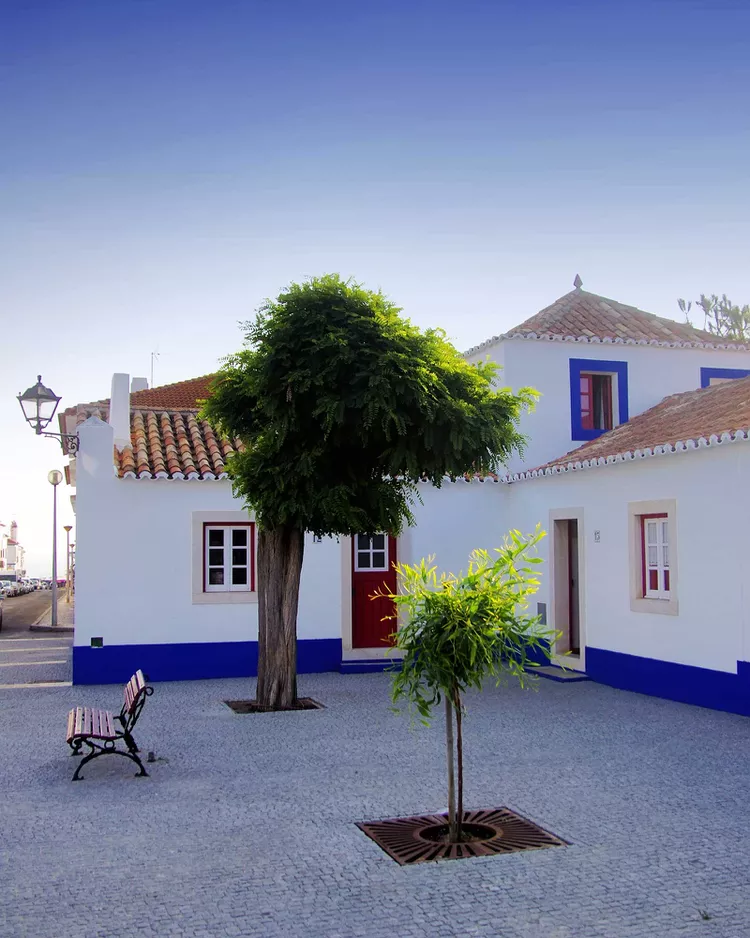My Own Private Portugal – Porto Côvo
One writer finds her own private Portugal in Porto Côvo, a fishing village in the Alentejo.
The Alentejo region is Portugal’s largest, covering much of the southern third of the country, and its least densely populated. The terrain varies wildly— from vineyards and rolling farmland dotted with cattle to sprawling, shadowy groves of cork trees — and the culture is rooted deeply in land and sea. Nearly everyone in Portugal has a place in the Alentejo to reminisce about — a personal Eden. For me, that place is Porto Côvo, a seaside town about two hours south of Lisbon.
Rich History and Serene Atmosphere
Porto Côvo gained prominence as a trading post for the Carthaginians. However, much history and many populations have shaped the coast over the years, yet this whitewashed fishing village retains the languid pace common to tiny, ancient places.
Natural Attractions and Outdoor Activities
An increase in overseas tourism has recently brought an influx of weekenders to the Alentejo, but Porto Côvo remains sleepy. No crowds throng the praças, the cobblestoned village squares. It is easy to find oneself alone on a secluded fine-sand beach, staring out at the wild swells — where you’ll often see the growing community of surfers, thanks in part to Alentejo native André Teixeira and his pioneering surf school, Costazul Surf. Additionally, you can wander off to portions of the Rota Vicentina, a network of 280 miles of peaceful trails running along the coast and into the interior. This path incorporates a historic pilgrimage route, with devoted travelers traversing the entire length to Cabo de São Vicente — where a lighthouse now stands on the ruins of a Franciscan monastery. Pousadas have sprung up along the way to accommodate them.
Culinary Delights
During my visit to Porto Côvo, I enjoyed exploring its quaint restaurants. Most are simple spaces hardly decorated save for colorful tile behind the bar. Regardless of which restaurant I chose, a basket of soft bread with fresh butter typically greeted me, accompanied by local goat cheese and sardine pâté, its richness cut with briny olives. I would often pause between bites to order a carafe of the local white wine, reflecting the ancient viticulture brought by Phoenicians and Greeks to the Alentejo, noted for its unique terroir.
My meal order soon became routine: presunto de pata negra, the well-marbled ham of the black pig; a bowl of clams cooked in white wine; and a platter of the morning’s catch. At Taska do Xico, that means choco frito (fried cuttlefish), enjoyed with fingers and a generous squeeze of lemon. At Zé Inácio, grilled octopus is the specialty, curled atop boiled carrots, potatoes, and cabbage.
:max_bytes(150000):strip_icc():format(webp)/cabeca-da-cabra-PORTOCOVO1119-b04d0641ee8040b2a5d0a0bd8fb9f288.jpg)
Family-Friendly Atmosphere
We later returned to Porto Côvo with our 18-month-old twins in tow. The Portuguese culture warmly embraces children, who are welcome everywhere — including at our favorite inn, Cabeça da Cabra, a few miles outside town. Owner Maria Santos, who grew up nearby, has transformed an old schoolhouse into a charming small hotel, where she now prepares breakfasts with fruit from her garden, tending to her olive trees, and enjoying the sounds of nature.
It was through Santos that we discovered our favorite dine-in experience in Portugal: O Amândio, affectionately nicknamed “Julinha” in honor of the matriarch who still works the massive wood-fired grill. Whenever we visit, we order whatever Julinha has on special, often indulging in local delicacies like morcela, the local blood sausage, or whole grilled robalo.
Finding Home in Porto Côvo
On our most recent Porto Côvo visit, looking for a bit of space to spread out, we found a villa called Casão. Its name translates, literally, to “big house.” This whitewashed former coal silo on the outskirts of town features a terrace that captures the sea breeze with views of the open ocean and Pessegueiro Island. My children eagerly threw open the French doors, excited by the nearness of the wild Atlantic. Meanwhile, my husband and I enjoyed glasses of wine and local cheese on the sandy stairs overlooking the rocks while watching the twins point excitedly at the gulls diving for their supper. This is my Porto Côvo: fleeting saudade and sweet nothingness, golden sunlight and the smell of the sea.
A version of this story first appeared in the November 2019 issue of iBestTravel under the headline My Own Private Portugal.




